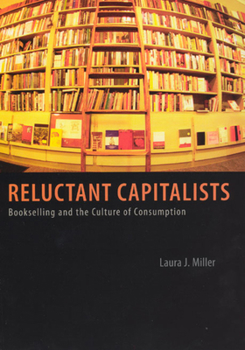Reluctant Capitalists: Bookselling and the Culture of Consumption
Select Format
Select Condition 
Book Overview
Over the past half-century, bookselling, like many retail industries, has evolved from an arena dominated by independent bookstores to one in which chain stores have significant market share. And as in other areas of retail, this transformation has often been a less-than-smooth process. This has been especially pronounced in bookselling, argues Laura J. Miller, because more than most other consumer goods, books are the focus of passionate debate. What drives that debate? And why do so many people believe that bookselling should be immune to questions of profit? In Reluctant Capitalists, Miller looks at a century of book retailing, demonstrating that the independent/chain dynamic is not entirely new. It began one hundred years ago when department stores began selling books, continued through the 1960s with the emergence of national chain stores, and exploded with the formation of "superstores" in the 1990s. The advent of the Internet has further spurred tremendous changes in how booksellers approach their business. All of these changes have met resistance from book professionals and readers who believe that the book business should somehow be "above" market forces and instead embrace more noble priorities. Miller uses interviews with bookstore customers and members of the book industry to explain why books evoke such distinct and heated reactions. She reveals why customers have such fierce loyalty to certain bookstores and why they identify so strongly with different types of books. In the process, she also teases out the meanings of retailing and consumption in American culture at large, underscoring her point that any type of consumer behavior is inevitably political, with consequences for communities as well as commercial institutions.
Format:Paperback
Language:English
ISBN:0226525910
ISBN13:9780226525914
Release Date:March 2004
Publisher:University of Chicago Press
Length:328 Pages
Weight:1.03 lbs.
Dimensions:0.7" x 6.2" x 8.9"
Customer Reviews
3 ratings
Highly recommended for booklovers concerned about the "bookstore wars"
Published by Thriftbooks.com User , 18 years ago
Booklovers who wouldn't usually be inclined to read something about the bookselling industry will appreciate this detailed account of the business, particularly in light of the ongoing -- and often ruinous -- competition between independent bookstores, the mega-chains, the "big box" retailers and the online giants.
A very interesting view
Published by Thriftbooks.com User , 18 years ago
The author looks a bookselling and especially book buying from a very sophisticated standpoint taking many economic, social, and cultural factors into account. The idea that the book both is and isn't a commodity like any other is examined up down and sideways. One interesting point: the rise of giants Borders and Barnes and Noble has made buying a book an entertainment experience (e.g., people go on dates at Borders!).
A history of the contested practice of selling books
Published by Thriftbooks.com User , 19 years ago
Reluctant Capitalists: Bookselling And The Culture Of Consumption holds the ability to appeal beyond the usual business reader, moving into the realm of book enthusiasts and booksellers alike. Book buyers often reject chain stores and consider any association between books and mass marketing unacceptable: so why is it that other chains have gained wide popularity while the chain bookstore's image struggles? Reluctant Capitalists examines this phenomenon, providing a history of the contested practice of selling books and surveying the rise of chains, mega-chains, and standing conflicts between chains and the small bookseller. Ideals and politics as well as book-buying habits and choices are analyzed in chapters which interview both book reader and major industry players.





